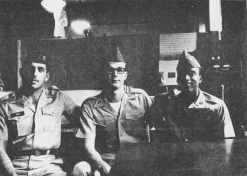“Conscience is a costly thing, and I am paying dearly for the rights to my mind. Five years a cement wall and cold iron bars… is the price I am paying for real freedom. If it must be this way, I accept it gladly, knowing that the satisfaction, the pride and the honor I am feeling because of my actions will bring me through, whatever punishment my master’s hand down on me.”

These were the words of Pvt. David Samas, written from prison and read at a public meeting for the Fort Hood Three, the three GIs recently sentenced to prison for their refusal to go to Vietnam. [See “Letter from a Prison Cell” in this issue.]
The Fort Hood Three Defense Committee released letters from the 3 prisoners wherein they described, more fully, their prison routine and status. James Johnson and Dennis Mora are cellmates in an 8 by 10 cell. David Samas is alone in a 6 by 8 cell.
None have any speaking privileges nor are they permitted any contact with other prisoners for, according to prison officials, “their own protection.”
However, this does not seem to be the case. They are greatly admired by their fellow prisoners and apparently the prison officials fear that any fraternizing between them might inspire others to take the same stand. Samas explained in one statement that many guards and fellow prisoners find occasion to speak to him, presumably to find out his story because there are such strict orders not to converse or associate with him. This, accompanied by the fact that the three have been ordered to remove name tags from their uniforms and from above their cell doors, arouse much curiosity among those surrounding them.
Samas discovered that his beliefs are easily accepted and almost always agreed with; however, very few can understand exactly why he refused to go. He is confronted with such questions as “Which is easier, one year in Vietnam or five years in prison? Why didn’t you just go AWOL and get thrown out of the army? Why didn’t you refuse the draft? Why did you make it a public issue?” And, finally, their most basic question, “what is in it for you?” So very few Americans can comprehend the word “honorable.” Samas states, “I chose to take the hardest possible path because it was, to my belief, the most honorable one…I cannot, I will not violate my convictions.”
The three are forced to spend 13 hours each day standing. As of October 7, the date of the letters, all other prisoners were forbidden to even look in their direction under penalty of being put in the box i.e. an unlit, unventilated cell wherein the inhabitant exists on a bread, potatoes and water diet. None of the three men are permitted to have shoe strings or razor blades. Mail is about a week late in reaching them because it must be censored; this Johnson, Mora and Samas voluntarily agreed to—the choice was having their mail censored or having no mail at all.
Heat in the cells is very irregular and the floors, on which they eat, are cold and damp. The cells are infested with flies. Exercise supposedly consists of hour long walks around a fenced yard, however, these are not on a regular basis. When permitted, the three are restricted to one particular corner of the yard.
In the aforementioned statement of Mora, released at a New York rally on their behalf, he made some beautifully toxic statements while speaking of his “privilege” to read a newspaper. “We see how old birds will still want to play Dr. Strangelove with nuclear weapons. We know that superbird is off to give another puppet show. We also see how a parrot at the UN is squawking ‘Peace, Peace’ while at the same time it is announced that war Plans for 1968 are already completed.” His morale, and that of Johnson and Samas, appears to be as well as can be expected considering their situation.
Meanwhile, as the major portion of the American press remains silent about the Fort Hood Three, James Weschler, Editorial page editor of the NEW YORK POST condemned the treatment inflicted on the three in a POST article. Groups from Baltimore and Washington, DC staged demonstrations outside, Fort Meade several weeks ago. The defense headquarters has received numerous inquiries from England, France, Japan, Canada and several Asian countries, as to what they can do to help. On October 9 at a New York rally Dwight MacDonald, literary critic for the NEW YORKER, Jules Feiffer, cartoonist for the VILLAGE VOICE and the NEW YORK POST, Lincoln Lynch of CORE and several others spoke on behalf of the Fort Hood Three. Pete Seeger also attended and sang.
The DuBois Club, SDS, Student Peace Union, Harlem Council for Jobs and Freedom, and others held a demonstration outside the New York State Selective Service Office. A small but active committee has been established in the Puerto Rican community.
Relatives of the men will be speaking on behalf of the Fort Hood Three during the November 5 8 mobilization throughout the country and including the Detroit area. “Free the Fort Hood Three” will be one of the major demands in the November peace mobilization.
Contributions for the defense of the three men should be sent in tare of the Defense Committee, 5 Beekman St., 10th Floor, NYC 10038.
Related
- Fifth Estate’s Vietnam Resource Page
- “Letter from a Prison Cell” in this issue
